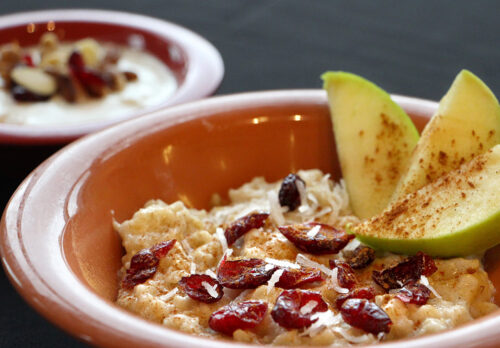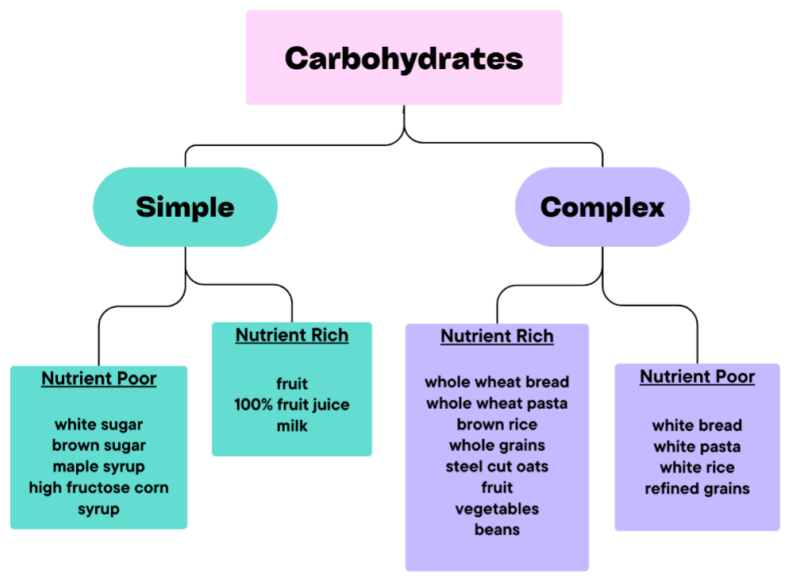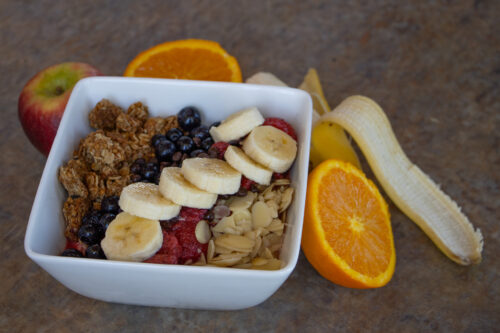 Carbohydrates are essential macronutrients that are the preferred form of fuel by our brains and nervous system. They can be a great source of vitamins, minerals, and fiber. Healthy carbohydrates can also decrease one’s risk for heart disease. But not all carbohydrates are created equal.
Carbohydrates are essential macronutrients that are the preferred form of fuel by our brains and nervous system. They can be a great source of vitamins, minerals, and fiber. Healthy carbohydrates can also decrease one’s risk for heart disease. But not all carbohydrates are created equal.
Simple carbohydrates are monosaccharides (fructose, glucose, and galactose) and disaccharides (sucrose, maltose, and lactose). Because they have a simple structure, they are quickly absorbed into the blood stream. Simple carbohydrates can be found in most carbohydrate sources.
Complex carbohydrates are polysaccharides (starch, glycogen, and fiber) and found in foods like vegetables, beans, fruit, pasta, grains, rice, and bread. They have a complex structure and are therefore absorbed slowly into the blood stream.

It is generally recommended that about 45-65% of your daily calories should come from carbohydrates, but it’s important to be able to recognize the difference between the nutrient rich vs nutrient poor options.
Nutrient poor carbohydrate options tend to consist of highly sugary foods and are lacking in beneficial micronutrients.
Nutrient rich options include things like fruit, milk, and whole grains:
- Fruits contains simple sugars but are also full of fiber. 100% fruit juice lacks fiber but contains several essential vitamins, like vitamin C.
- A glass of milk contains about 1/3 of the amount of calcium a college student needs per day.
- Whole grains are made up of a fiber-rich bran layer, a starchy endosperm, and a nutrient rich germ core.
- Whole grains are much richer in nutrients than refined grains because, unlike refined grains, whole grains do not go through the milling process where the nutrient-rich bran and germ are stripped away from the seed.
 When eating in the dining commons there are many ways to incorporate nutrient-rich carbohydrates into your meal:
When eating in the dining commons there are many ways to incorporate nutrient-rich carbohydrates into your meal:
- Every dining common has a potato bar with baked russet and sweet potatoes served daily. You can top potatoes with nuts, seeds, salsa, yogurt, and beans for added nutrients.
- Fruit is an easy way to incorporate complex carbs into your diet if you are in a hurry. Grab and apple or banana each day, both contain potassium and fiber.
- Another easy way to include complex carbs into your diet is at the yogurt bar: add walnuts, pecans, fresh fruit, dried fruit, and your favorite whole grain cereal for extra nutrients.

